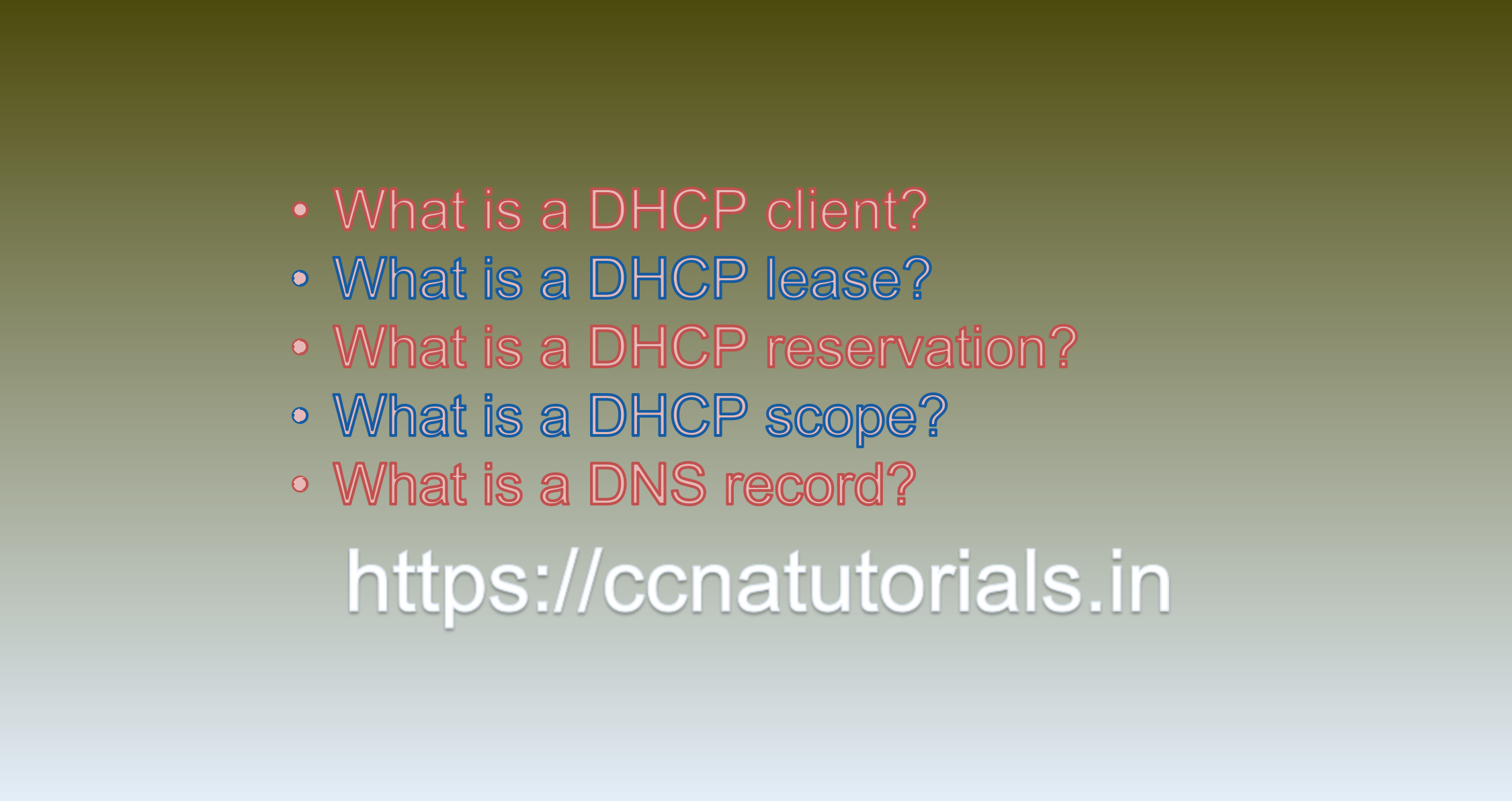Contents of this article
In this article, I describe some CCNA sample questions for practice before appearing in the CCNA 200-301 exam. The following questions are basic questions and related to the CCNA sample questions set 19. There are multiple sample questions set on this website for prior practice online. All questions are described with relevant answers. You can take the following questions and answer as reference for CCNA 200-301 exam. You may also need to do more practice with other websites and books to practice the CCNA sample questions set 19.
Question 1. What is a DHCP client?
A DHCP client is a device or software application that requests and receives IP address configuration parameters from a DHCP server on a network. These configuration parameters typically include an IP address, subnet mask, default gateway, and DNS server addresses.
When a DHCP client is connected to a network, it sends a broadcast message called a DHCP Discover message to discover available DHCP servers on the network. Any DHCP server that receives the Discover message can respond with a DHCP Offer message containing IP address configuration parameters.
The DHCP client can then choose one of the offers and request the configuration parameters from the corresponding DHCP server by sending a DHCP Request message. Once the DHCP server receives the Request message, it assigns the requested IP address and configuration parameters to the client, and sends a DHCP Acknowledge message to confirm the assignment.
The DHCP client then configures its network interface with the assigned IP address and configuration parameters, allowing it to communicate with other devices on the network. The DHCP client will typically renew its IP address lease periodically by sending a DHCP Request message to the DHCP server, ensuring that it maintains a valid IP address configuration as long as it remains connected to the network. This is the answer to question 1 of CCNA sample questions set 19.
Question 2. What is a DHCP lease?
A DHCP lease is a temporary assignment of an IP address and other configuration parameters by a DHCP server to a DHCP client. When a DHCP client requests an IP address from a DHCP server, the server can assign the client an available IP address for a limited period of time, known as the lease period or lease time.
During the lease period, the DHCP client is authorized to use the assigned IP address and other configuration parameters such as subnet mask, default gateway, and DNS server addresses. The DHCP client can use the assigned IP address to communicate with other devices on the network.
When the lease period expires, the DHCP client must renew its lease by requesting an extension of its lease from the DHCP server. If the DHCP client fails to renew its lease in time, the DHCP server may reassign the IP address to another device.
DHCP leases are important because they allow networks to efficiently manage and conserve IP addresses. DHCP servers can dynamically assign IP addresses to clients as they connect to the network, and reclaim them when clients disconnect or their lease expires, ensuring that IP addresses are not wasted or left unused. This is the answer to question 2 of CCNA sample questions set 19.
Question 3. What is a DHCP reservation?
A DHCP reservation is a configuration setting on a DHCP server that assigns a specific IP address to a DHCP client based on the client’s MAC address. When a DHCP server assigns IP addresses to clients, it can use a pool of available addresses to dynamically assign addresses to clients that request them. However, for devices that require a static IP address, a DHCP reservation can be created to ensure that the same IP address is always assigned to that device.
To create a DHCP reservation, the administrator configures the DHCP server to reserve a specific IP address for a client with a specific MAC address. When the client requests an IP address from the DHCP server, the server checks its reservation table and assigns the reserved IP address to the client if a reservation exists.
DHCP reservations are commonly used for devices that require a fixed IP address, such as servers, printers, or network devices. By reserving an IP address for a specific device, network administrators can ensure that the device always has the same IP address, making it easier to manage and access on the network. This is the answer to question 3 of CCNA sample questions set 19.

Question 4. What is a DHCP scope?
A DHCP scope is a range of IP addresses that a DHCP server is configured to lease to clients on a network. When a client device requests an IP address, the DHCP server will allocate an available IP address from within the defined scope.
A DHCP scope typically includes the starting and ending IP addresses that are available for lease, as well as subnet mask, default gateway, and DNS server information that the DHCP server provides to clients along with their IP address.
For example, a typical DHCP scope might be configured with a starting IP address of 192.168.0.100 and an ending IP address of 192.168.0.200, with a subnet mask of 255.255.255.0, a default gateway of 192.168.0.1, and DNS servers of 8.8.8.8 and 8.8.4.4. When a client device requests an IP address, the DHCP server will allocate an available IP address from within the range of 192.168.0.100 to 192.168.0.200, along with the subnet mask, default gateway, and DNS server information.
DHCP scopes are used to manage the distribution of IP addresses on a network and help ensure that IP addresses are allocated efficiently and without conflicts. This is the answer to question 4 of CCNA sample questions set 19.
Question 5. What is a DNS record?
A DNS record is a type of data stored in a DNS server that maps domain names to IP addresses. When a user types a domain name into their web browser, the computer sends a DNS request to a DNS server to find out the IP address associated with the domain name. The DNS server looks up the corresponding DNS record for the domain name and returns the IP address to the user’s computer, which then uses it to establish a connection with the web server hosting the website associated with the domain name.
DNS records are stored in a hierarchical tree-like structure called the Domain Name System (DNS). The DNS system includes multiple levels of name servers, each responsible for storing and managing DNS records for a specific domain or set of domains. DNS records come in different types, such as A, AAAA, CNAME, MX, TXT, and others, each with its specific purpose.
Overall, DNS records are essential for enabling communication between devices on the internet by mapping human-readable domain names to their corresponding IP addresses. This is the answer to question 5 of CCNA sample questions set 19.
Conclusion for CCNA sample questions set 19
In this article, I described 5 questions with answers related to CCNA 200-301 exam. I hope you found these questions helpful for the practice of the CCNA 200-301 exam. You may drop a comment below or contact us for any queries related to the above questions and answers for CCNA 200-301. Share the above questions If you found them useful. Happy reading!!






